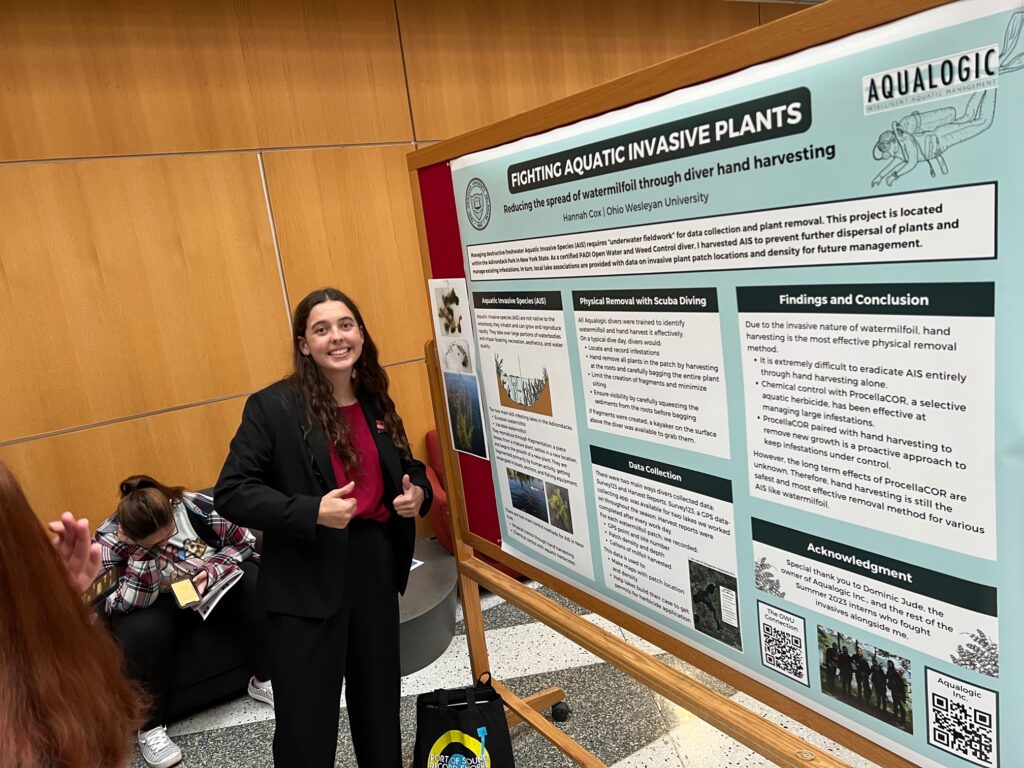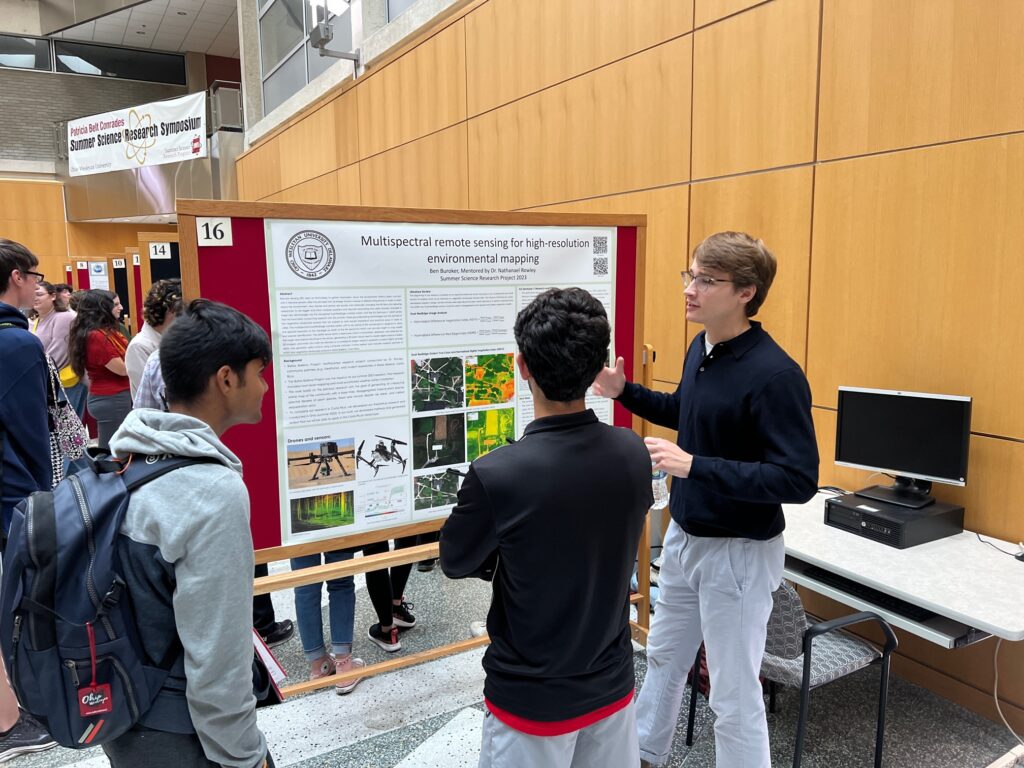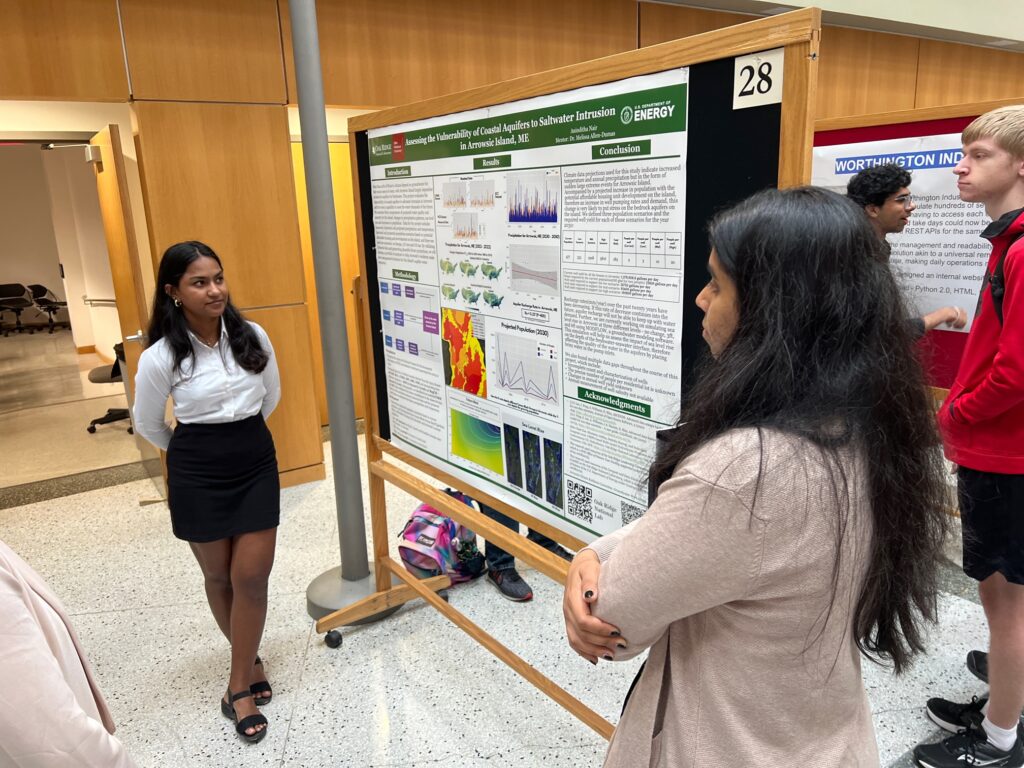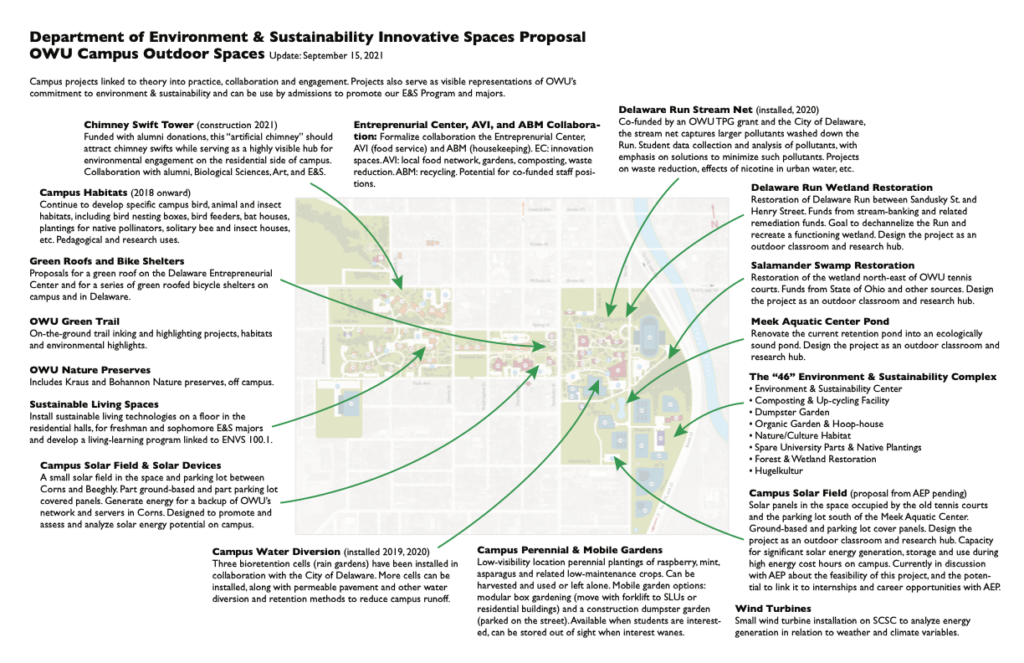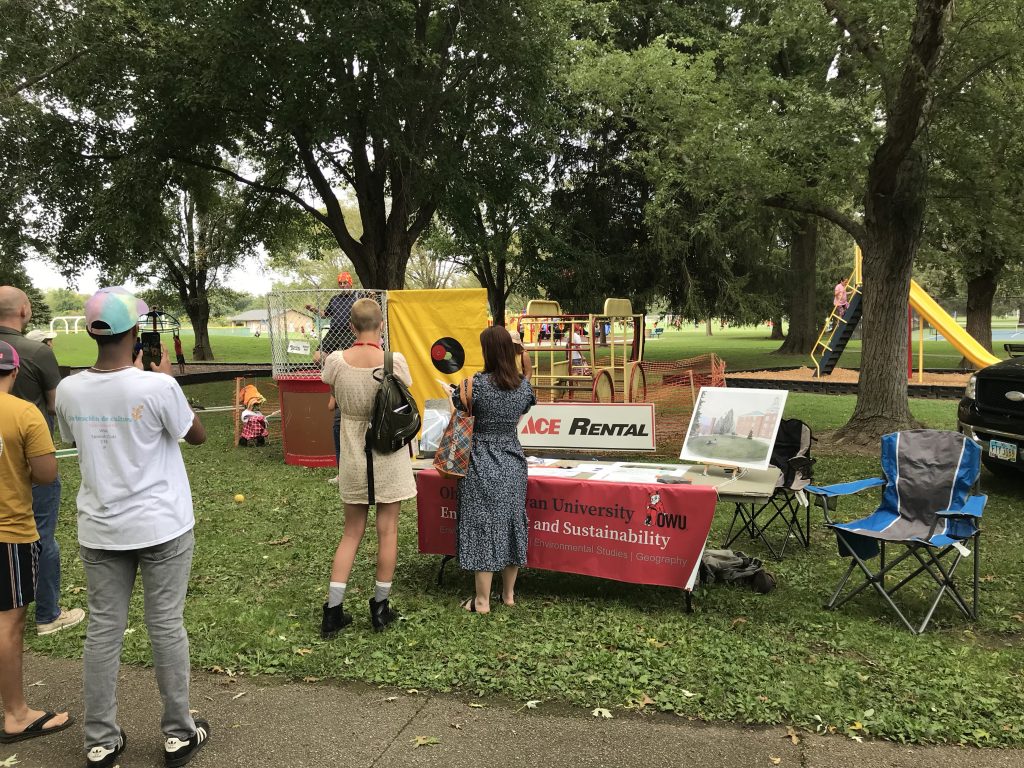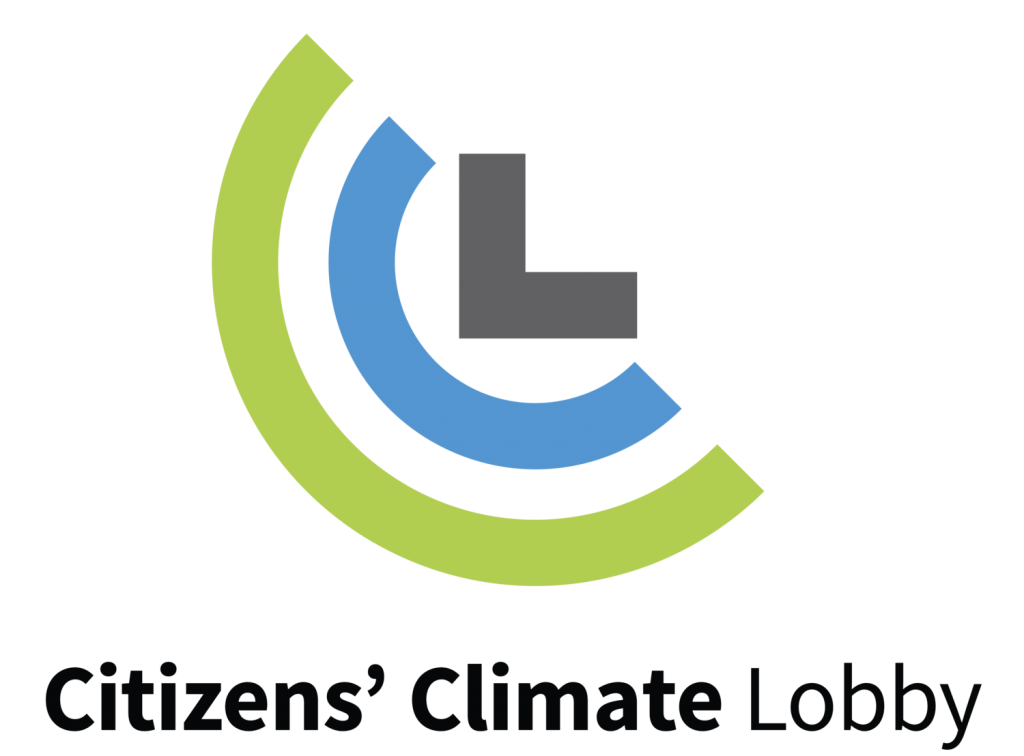OWU has two student-led organizations, affiliated with the Department of Environment and Sustainability. Click on either for more information…
Category: Energy
Fall ENVS Student Research @ OWU Connection Conference
Hannah Cox: Fighting Aquatic Invasive Plants: Summer ’23 Internship
Logan Fraire waiting to present her poster: What Factors Affect Thermoregulatory Decisions in Wall Lizards. Summer Science Research.
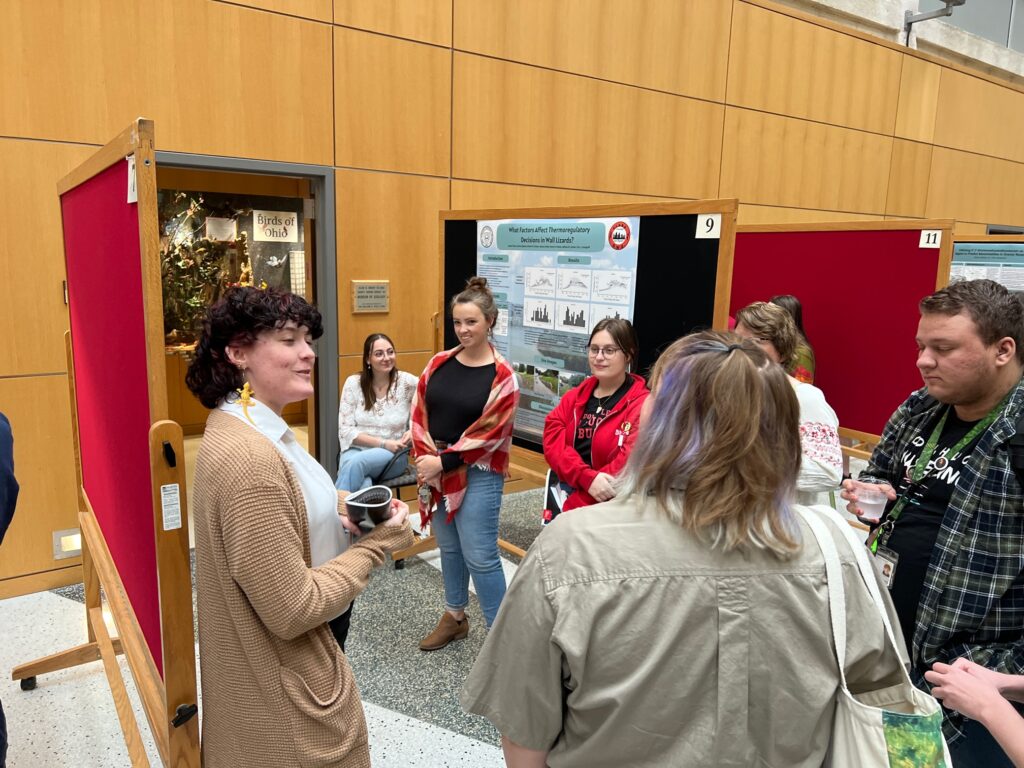
Ben Buroker: Multispectral Remote Sensing for High Resolution Environmental Mapping. Summer Science Research.
Aninditha Nair: Assessing the Vulnerability of Coastal Aquifers to Saltwater Intrusion in Arrowsic Island, Maine. Internship
Moving Sustainability Forward at OWU: Upcoming Meetings
 Mark your calendars and watch for more information on two upcoming really important meetings regarding sustainability at OWU:
Mark your calendars and watch for more information on two upcoming really important meetings regarding sustainability at OWU:
Thursday, February 10 at 6 pm (Beeghly Library 2nd Floor Bayley Room)
Friday, February 11 at noon (Beeghly Library 2nd Floor Bayley Room)
We are asking for volunteers to help with the first significant update to OWU’s Sustainability Plan since 2017. This is good for OWU and good for participants, who will engage in what is in essence a professional sustainability effort. This group and its efforts are not formally affiliated with or endorsed by the OWU administration but will develop a plan and set of recommendations in line with current sustainability practices, at peer institutions, organizations, and companies.
I will update this blog posting in the near future with more details.
Some background:
It’s been five years since OWU’s first Sustainability Plan – created by students – was adopted by OWU. The plan is, frankly, a bit toothless. It was vetted by students (primarily Emily Howald, ’18) and adjusted to the realities of an institution that was not yet ready to commit to more challenging sustainability goals. Keep in mind this was a time of major fundraising for the very important OWU Connection and also one of increasing enrollment challenges (felt by all colleges, as the number of college-age students declines in the US).
OWU is making progress. For example, the map below (right mouse click to see larger map) documents both existing and proposed sustainability projects on campus. These are largely grassroots projects, most involving students and the OWU Connection.
Move forward to Fall of 2021. Fred Copeman, OWU ’11, is in the graduate program for Sustainability Management at Columbia University. He takes on OWU as a case study, in a course, assessing the means by which OWU can seriously institute sustainability institution-wide.
Spring 2022: Fred will be on campus to move the effort forward on Thursday, February 10, and Friday, February 11. Meetings with students, staff, and faculty are scheduled for Thursday, February 10 at 6 pm (Beeghly Library 2nd Floor Bayley Room) and Friday, February 11 at noon (Beeghly Library 2nd Floor Bayley Room).
Updates coming soon.
OWU Sustainability Task Force Meeting: Sept 27 @ Noon @ Merrick 201
Dr. Krygier in the OWU ENVS Dunk Tank at the Olentangy River Festival (Sept. 2021)
Our first STF Meeting for the Fall of 2021 is Monday, Sept. 27 @ noon in 201 Merrick Hall.
Organizer: AJ Lashaway
Dr. Krygier/AJ→ OWU Outside update (hopefully MTSO reaches out, call Audubon)(make QR code for groupme)
→ Chimney Swift tower
→ Energy Projects: big and small
→ Bioretention Cells
→ any other sustainability things going on on campus
Ed Pullen→ recycling + waste management on campus
Erin Wolfe→ sustainability in Delaware
→ watershed
→ events OWU students can attend/opportunities available to them
SK (Treehouse) → Green Week, house events outside students can attend/help with
And SO much MORE.
Renew Delaware: Renewable Community Electric Aggregation on Ballot
republished from Sustainable Delaware
Renewable Community Electric Aggregation
What is the ‘Renew Delaware’ ballot issue?
Sustainable Delaware Ohio (SDO) is advocating for the placement of a renewable electricity aggregation issue on the fall 2021 ballot. This ballot would give the City the power to negotiate a bulk price for purchasing electricity on behalf of you, its residents, and small businesses. The goal of the ballot is to lower household electric bills and increase the use of renewable (green) energy.
This is NOT A LEVY, meaning there will be no taxes on any resident, business, or other entity within the city limits.
We propose an Opt-Out solution, which automatically enrolls all local residents, unless they individually opt-out of the program and choose not to be included.
What needs to happen?
SDO urges the City of Delaware to make RENEWABLE a part of the proposed community electricity aggregation by seeking the maximum “green” content in proposals from suppliers.
- The Delaware City Council needs to be informed on what OPTIONS are available for electricity regarding opt-in/opt-out, net-metering, duration of the program, green energy, and compensation of energy consultants.
- Council requests proposals from a half-dozen energy consultants and selects one that meets the criteria.
- November Ballot: The Council will vote to put this issue on the ballot and submit it to the Delaware County Board of Elections prior to August 4 (at 4 p.m.).
- Informing all Delaware residents: by providing clear and transparent information. SDO offers the City of Delaware its assistance with that, as well as the Ohio Energy Council (OEC) and Councilman David Robinson from Worthington.
- Call your Council Member to tell them you support this issue.
- YOUR VOTE in November (it matters!)
- After this ballot measure gets approved by Delaware residents (November elections), the City can negotiate the most favorable contract for its residents based on cost and amount of green energy.
ReNew Delaware Benefits You
- No Change in Service: Under this program, you would experience no change in their electric service. AEP would continue to carry, service, and bill for the electricity service. The only change would be in the source of the electricity which will be identified on the AEP bill.
- COST SAVINGS: Worthington implemented a similar program and it saved their residents $46,024.62 in the first five months alone. (see this PDF)
- OPT-OUT: SDO advocates for a no-cost opt-out option for residents who do not wish to participate in the program, otherwise you are automatically enrolled.
- RENEWABLE ENERGY: Choosing this means you are part of a cleaner energy solution, and you can be proud of that! Renewable energy puts less greenhouse gasses in the air, and reduces our carbon footprint, especially if we use local resources.
Renew Delaware Benefits City and State
Delaware would join a number of other communities in the State of Ohio to choose renewable electricity aggregation. However, not all aggregation is the same. SDO finds the following important:
- REDUCE CARBON FOOTPRINT: (needs estimate)
- JOBS CREATED IN OHIO: For example, AEP’s Integrative Renewable Energy program uses OHIO WIND & SOLAR assets which supports job growth in Ohio.
- KEEP OUR TAXES IN OHIO: AEP is building renewable energy projects in Ohio, while other programs purchase credits from companies in other States and our taxes leave the state.
- NO MONEY OUT OF POCKET: This does not cost the City of Delaware any money.
- COMMUNITY INVESTMENT GRANTS: AEP has community investment grants available that can be used toward any project within the city, though we would like them to be sustainable.

How Green Energy Saves
The renewable energy will be purchased by way of Renewable Energy Certificates (RECs). Based on other communities’ experiences, it is expected that bulk pricing will make green energy feasible.
The current market rate in an aggregation program is no more than 4.75 cents/kWh fixed, while the five-year utility average has been roughly 6 Cents/kWh. As the typical household uses 12,000 kilowatt hours (kWh) per year, the projected estimated savings per household would be: .06000-.04750)x12,000 = $150.00
The City of Delaware has approximately 17,000 households. At 70% participation, the estimated annual savings for the community would be: 17,000x.70x$150.00 = $1,785,000
Questions?
For questions about this initiative, you can email us, or you can contact your Council representative for your ward.
OWU Reaffirms, We Are Still In on Paris Climate Accord
Ohio Wesleyan Reaffirms University’s Commitment to Paris Agreement
By Cole Hatcher
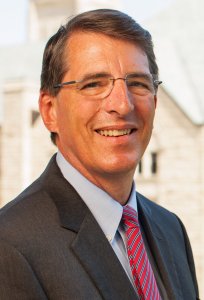
In June 2017, I signed the We Are Still In declaration on behalf of Ohio Wesleyan University, promising that Ohio Wesleyan would remain committed to the Paris Agreement to strengthen the global response to the threat of climate change, even if the United States pulled out of the agreement.
As the United States officially withdraws from the Paris Agreement on November 4, we proudly reaffirm our commitment to it.
At the time I signed the We Are Still In declaration, Ohio Wesleyan was one of 183 colleges and universities to have joined that commitment. We are encouraged that during the past two years the We Are Still In compact has grown to include more than 400 colleges and universities and more than 3,500 other U.S. cities, states, businesses, and other organizations. Clearly, support across America is strong and unwavering for the Paris Agreement and for doing all we can to slow and halt global warming.
The We’re Still In document states in part: “It is imperative that the world know that in the U.S., the actors that will provide the leadership necessary to meet our Paris commitment are found in city halls, state capitals, colleges and universities, investors and businesses. Together, we will remain actively engaged with the international community as part of the global effort to hold warming to well below 2℃ and to accelerate the transition to a clean energy economy that will benefit our security, prosperity, and health.”
We have a moral responsibility to future generations to join with all of humanity to reduce greenhouse gas emissions and fight manmade climate change. Climate impacts are already evident globally with rising seas, drought, and severe fires. The looming crisis could be infinitely more damaging than this pandemic and affects people of color and those living in poverty most severely. We are fighting to protect human health, the global economy, national security, and life as we know it. Climate change is an existential threat.
We urge our nation’s leaders to reverse course and not only rejoin the 186 other nations that have ratified the Paris Agreement but also become a leader in bringing together governments from around the world to overcome humanity’s greatest challenge.
Rock Jones
President, Ohio Wesleyan University
Zoom on 9/16/2020: Democracy Unchained: A Vision of Our Planetary Future:
Wednesday, September 16 @ 8pm
Registration here.
ROAR is a central Ohio group of climate and environmental activists. Their latest event is on Zoom, featuring some great speakers on contemporary politics and the environment.
We’d welcome your presence at ROAR’s next NEXT WORLD CONVERSATION on DEMOCRACY UNCHAINED… with David Orr from the Oberlin Project and Joel Wainwright, co-author of CLIMATE LEVIATHAN. How can we rebuild our democracy to significantly address the interlocking crises of Covid, Climate Change and our dysfunctional political system? Please join us–and spread the word!
WEDNESDAY, SEPTEMBER 16, 8:00 pm: DEMOCRACY UNCHAINED
 David W. Orr is the Paul Sears Distinguished Professor of Environmental Studies and Politics and Special Assistant to the President of Oberlin College. The Oberlin Project was formed out of David Orr’s vision of full-spectrum sustainability: an all-encompassing joint venture by the town and College to create a thriving, sustainable and environmentally friendly community in Oberlin. He is the recipient of six honorary degrees and other awards including The Millennium Leadership Award from Global Green, the Bioneers Award, the National Wildlife Federation Leadership Award, a Lyndhurst Prize acknowledging “persons of exceptional moral character, vision, and energy.” He has been a scholar in residence at Ball State University, the University of Washington, and other universities. He has lectured at hundreds of colleges and universities throughout the U.S. and Europe. He has served as a Trustee for many organizations including the Rocky Mountain Institute, the Aldo Leopold Foundation, and the Bioneers. He has been a Trustee and/or advisor to ten foundations.
David W. Orr is the Paul Sears Distinguished Professor of Environmental Studies and Politics and Special Assistant to the President of Oberlin College. The Oberlin Project was formed out of David Orr’s vision of full-spectrum sustainability: an all-encompassing joint venture by the town and College to create a thriving, sustainable and environmentally friendly community in Oberlin. He is the recipient of six honorary degrees and other awards including The Millennium Leadership Award from Global Green, the Bioneers Award, the National Wildlife Federation Leadership Award, a Lyndhurst Prize acknowledging “persons of exceptional moral character, vision, and energy.” He has been a scholar in residence at Ball State University, the University of Washington, and other universities. He has lectured at hundreds of colleges and universities throughout the U.S. and Europe. He has served as a Trustee for many organizations including the Rocky Mountain Institute, the Aldo Leopold Foundation, and the Bioneers. He has been a Trustee and/or advisor to ten foundations.
 Joel Wainwright is Professor in the Department of Geography at Ohio State University, where he studies political economy, social theory, and environmental change. He is author of Decolonizing Development (2008), Geopiracy (2013), and, with Geoff Mann, Climate Leviathan (2018).
Joel Wainwright is Professor in the Department of Geography at Ohio State University, where he studies political economy, social theory, and environmental change. He is author of Decolonizing Development (2008), Geopiracy (2013), and, with Geoff Mann, Climate Leviathan (2018).
#OWUENVS
In the overwhelming crush of media about the COVID 19 pandemic we don’t want to lose sight of the profound importance of the environment.
#OWUENVS is a collective effort to push environmental news and ideas and advocacy and creative efforts out through social media and other media by students, faculty, and staff in the Environment & Sustainability Program at Ohio Wesleyan University.
Find or create relevant stuff. Anything having to do with the environment anywhere. Links, ideas, videos, maps, photos, music, data, artwork, etc. Focus on the stuff you care about.
Put it out there: use the hashtag or tag #OWUENVS so we can track the effort. Focus on the media you use. On social media, video sites, music sites, whatever. Be creative.
Please let Meg Edwards or John Krygier or Laurie Anderson know if you have any questions, ideas, or suggestions.
This effort is what we make it. It keeps us connected, and it matters.
Speaker: Elli Sparks, Citizens’ Climate Lobby, Wednesday, October 30th at Noon
- Successfully worked with Congress to introduce (H.R. 763) The Energy Innovation and Carbon Dividend Act of 2019. CCL supports this bill, and is working towards its re-introduction in the Senate, and its passage through Congress.
- Instrumental in establishing the House Climate Solutions Caucus, a bipartisan group in the US House of Representatives which will explore policy options that address the impacts, causes, and challenges of our changing climate.
- Partnered with California state legislature to pass a resolution calling on the federal government to enact Carbon Fee and Dividend nationwide.
Elli is committed to the success of CCL volunteers working to start new chapters in communities across the United States. She hosts CCL’s weekly Introductory Calls and trains volunteers around the world to lead Climate Advocate Training Workshop; she also works closely with volunteers in coal and agricultural communities, ensuring that all voices find a place at the solutions table–a passion founded on her own family roots in Appalachia and rural Maryland.
Elli’s work is informed by her fifteen years in nonprofit management and by her founding and leadership of Virginia’s first CCL chapter, where she gained experience in nearly every volunteer role. She lives on a family farm in rural Virginia, where she rotates her cattle through the pasture to store carbon in soil and plants.
Please do try to come! It’s a great opportunity to find your voice and political will for climate solutions. We also have a chapter at OWU if you want to stay involved!
Thanks,
Mahnoor Ansari,
Campus Leader, CCL OWU
OWU’s ‘Still In’ Paris Climate Agreement
President Rock Jones, Ph.D., signed the document June 5, making Ohio Wesleyan one of 183 colleges and universities to endorse the proclamation. “We Are Still In” also has been signed by representatives from 125 cities and nine states, and by 902 businesses and investors.
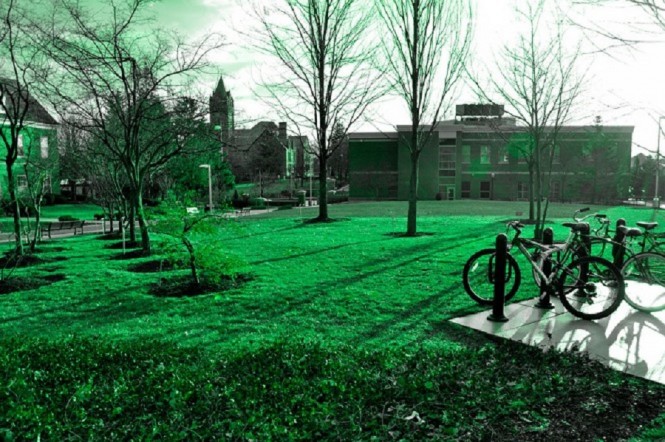
University Among Those Supporting Paris Climate Agreement
There’s a familiar name among the 1,219 who signed the “We Are Still In” document in support of the Paris Agreement and its efforts to combat climate change.
President Rock Jones, Ph.D., signed the document June 5, making Ohio Wesleyan one of 183 colleges and universities to endorse the proclamation. “We Are Still In” also has been signed by representatives from 125 cities and nine states, and by 902 businesses and investors.
“It is imperative that the world know that in the U.S., the actors that will provide the leadership necessary to meet our Paris commitment are found in city halls, state capitals, colleges and universities, investors and businesses,” the document states. “Together, we will remain actively engaged with the international community as part of the global effort to hold warming to well below 2℃ and to accelerate the transition to a clean energy economy that will benefit our security, prosperity, and health.”
There are many reasons for Ohio Wesleyan to sign the document, Jones said. Perhaps most notable is the pioneering work of F. Sherwood Rowland, Ph.D., a 1948 OWU graduate.
A Delaware native, Rowland earned the 1995 Nobel Prize in chemistry for his work studying chlorofluorocarbons (CFCs). His research led to significant discoveries in the field, including that chemicals in aerosol sprays, air conditioners and foam insulation were damaging the oxygen layer surrounding the earth’s atmosphere.
At a White House climate change roundtable in 1997, Rowland spoke passionately on behalf of scientists concerned about global warming: “Isn’t it a responsibility of scientists, if you believe that you have found something that can affect the environment, isn’t it your responsibility to do something about it, enough so that action actually takes place? If not us,” Rowland said, “who? If not now, when?”
Woodrow W. Clark II, Ph.D., a 1967 Ohio Wesleyan alumnus, also made an impact through his efforts to protect the environment as one of 30 members of the Intergovernmental Panel on Climate Change (IPCC). The IPCC was a co-recipient of the 2007 Nobel Peace Prize, along with former U.S. Vice President Al Gore, for the film “An Inconvenient Truth.”
The spirit of “We Are Still In” also connects well with Ohio Wesleyan’s academic program and the April announcement that it was creating an Environment and Sustainability Program with a new environmental science major this fall, Jones said.
The Environment and Sustainability Program will include the collaboration of nearly 20 Ohio Wesleyan faculty members who specialize in the natural sciences, social sciences, arts, and humanities. One of the program’s highlights its innovative “Conversations: Toward a Sustainable Future” course. Students will take the course twice – once as newly declared environmental science majors and once as seniors in the program – to provide both a cornerstone and capstone for their study of ecological issues.
In addition, Jones said, Ohio Wesleyan’s signature Sagan National Colloquiumlecture series also has spent a semester examining global warming.
“In 2013, the entire campus focused attention on the ‘Interdisciplinary Impacts of Climate Change’ through the Sagan National Colloquium,” Jones said. “The Colloquium’s founding vision of connecting the liberal arts with civic arts – studying a topic and taking action in response to that study – is reflected in our signing of the ‘We Are Still In’ document.”
Learn more about the “We Are Still In” initiative at http://wearestillin.com.



